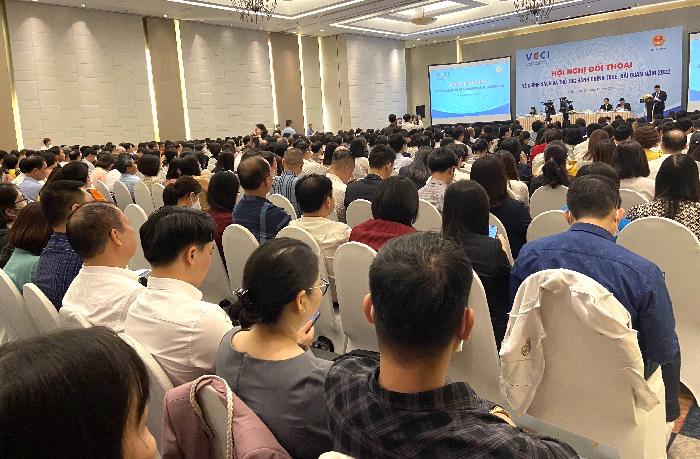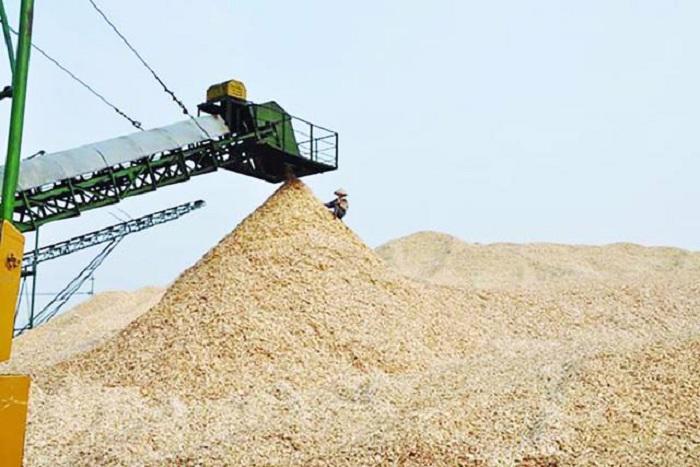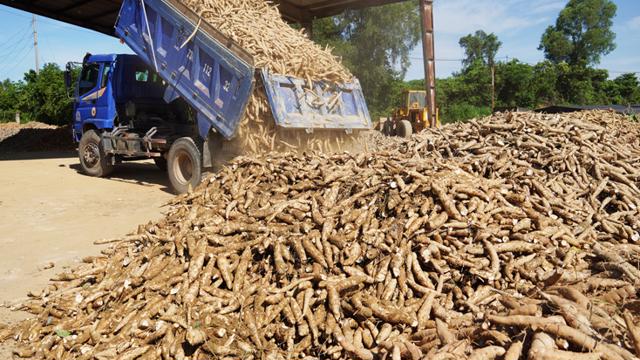[ad_1]
These are the opinions presented at the “Dialogue on tax and customs administrative policies and procedure in 2022” conference on November 22 by the Vietnam Chamber of Commerce and Industry (VCCI) in cooperation with the Ministry of Industry and Trade Finance (General Department of Customs and General Department of Taxation).
In the opening remarks, Mr. Pham Tan Cong, Chairman of the VCCI, said that the Ministry of Finance’s reform efforts in the past period have produced important results and impacted the operating environment of the business world.
Looking back to the time when the dialogue program was implemented 16 years ago, one of the indicators according to the World Bank’s 2006 assessment of Vietnam, Vietnam’s tax payment index is the lowest in the region after Laos and Cambodia.
But so far, with the determination to carry out the reform, with the efforts and motto of drastic action, listening to the opinions of the business community, the increasingly professional and modern work style of employees.The Ministry of Taxes – Customs … has the overlaps in Handling processes and procedures reduced…

However, at the conference, many companies brought up their specific difficulties and suggested that the tax and customs sector should eliminate them in order to create a more favorable business environment for them.
Perhaps the tax refund issue is what causes many exporters the most “grief”. Mr. Thang Van Thong, vice chairman of Vietnam Timber and Forest Products Association, vice head of Vietnam Wood Chips Association, assessed that customs industry administrative procedures are now better and do not cause many problems for import and export companies. But in the tax area, there are still many shortcomings related to exported goods and tax refund dossiers for exporting companies.
Speaking on behalf of the timber industry companies, Mr. Thong said that wood chip exporters face many problems. In particular, the General Department of Taxation has issued many documents directing all local tax authorities to verify the provenance of timber and bring timber into the high-risk industry. Verify the origin of the wood from the forest farmer until the shipment is exported.
Therefore, the verification process must take a long time, which increases the time for the business tax refund. While the company capital remains in the VAT refund phase. In addition, there are the liabilities such as wages, bank interest, goods, etc., the business still has to turn every day.
“The prior checking scheme is refunded after a maximum of 40 days, but with this scheme I am afraid that 1 year will not be completed. That’s the problem for all companies in the industry,” said Mr. Thong.
These regulations make it difficult for companies. As an export shipment was strictly inspected and controlled by the company when purchasing raw materials, and after boarding the ship, the exported goods were also inspected by the customs authority for each shipment.
Even the wood chip industry has been an export business for traditional partners for many years…but when this file was returned for tax refund, the local tax office did not refund it, the reason was from the General Tax Office document to check the final origin…

“So it’s harder for companies to fund and turn capital around. If this pace is maintained, timber-exporting companies will have no capital to turn around, affecting forest plantation budgets as well as SMEs selling goods to large export companies,” Thong said.
To solve this problem, Mr. Thong suggested that when the dossier is complete and has been monitored by customs, it should be shared to refund the tax in advance for businesses, so as not to delay businesses or cause traffic jams .
Similar to the timber industry, the export cassava industry is also entangled. Mr. Pham Vu Ha, Secretary-General of the Vietnam Cassava Association, said that the General Department of Taxation issued Official Letter 2495 on July 8, 2021, followed by Official Letter 632 on March 7, 2022, directing local tax authorities to customers Those who buy goods check from China for tax refund applications.
Local tax authorities rely on this policy to screen customers and buyers from China, resulting in the suspension of VAT refunds from cassava exporters. By that time, the tax amount of the whole cassava industry is about VND 1,000 billion by that time, when counted in the coming period, it will be even higher.
Cassava is now Vietnam’s most important export product. As one of the 13 national key crops, one of the three exported trees with sales exceeding $1 billion, with hundreds of companies providing jobs for 1.2 million workers.
China is Vietnam’s largest cassava export market with a 93% share. The cassava industry is not only difficult because of the tax refund, but now has to compete fiercely with Thailand and Indonesia… While Thailand and Indonesia have the advantage of a large and good logistics system, Vietnam’s cassava has only an export advantage. Border with China (accounting for 60%).
Mr. Ha said that this story has been going on for more than 2 years. Associations and companies have made recommendations to the General Department of Taxation, the Treasury Department and the Prime Minister. The Prime Minister has issued 3 landmark documents, the Treasury also has a written response to coordinate with the Association to address specific difficulties in processing tax refund dossiers.
But up to this point, the Ministry of Finance has not responded to certain documents to help companies solve this problem, which makes companies both concerned and concerned, and local tax authorities are confused in solving this problem.
“The VAT refund issue, if not solved in connection with difficult bank loans affected by the economic and geopolitical crisis in the world… surely the cassava industry will decline, the market share will belong to the competitors,” Mr. Ha said .
Therefore, the representative of the cassava association would like the relevant authorities to issue a circular on this matter in order to eliminate difficulties for the cassava industry.
Facing the above issues, Deputy Finance Minister Cao Anh Tuan stressed that in the near future the ministry will focus on drastic and effective implementation of solutions to taxes, fees and charges that have been and will be enacted in the near future. to evaluate the implementation in order to find solutions that are suitable for the actual situation.
At the same time, continue to research and advise on the evaluation, review, amendment and supplementation of tax laws, in accordance with the tax system reform strategy to 2030, in order to synchronously complete the tax policy system by the standards of a good tax system in line with international customs. Towards a tax system with a sustainable structure that ensures the rational mobilization of resources for the state budget, contributes to the creation of a favorable and fair investment and business environment, encourages investment, promotes competition…
[ad_2]
Source link

